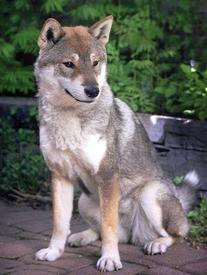
A rare breed of hunting dog established in Japan, the Shikoku is a dog of antiquity. Hailing from the Kochi Prefecture mountains of Shikoku island, the breed was officially recognised as a Japanese national treasure in 1937, being prized by the Matagi hunters for its abilities as a working dog. Primarily bred to hunt large game, including wild boar and deer, the Shikoku possessed a strong prey drive and a keen energy that enabled it to work difficult terrain for long periods of time. Due to the isolated nature of its early existence, the Shikoku was able to remain relatively pure, with cross-breeding being greatly restricted. Very few Shikokus exist outside native Japan, and one can pay a high price for importing a rare Shikoku puppy.
A dog of medium-sized build, the Shikoku boasts many identifiable traits. In structure and appearance, the Shikoku bears a striking resemblance to the Alaskan Husky. With a proportioned build, moderate-length legs, a round face and high-set, triangular ears, as well as a profuse double coat in colours of red or black sesame. The dense coat would have served to insulate the dog from the harsh mountain climate from where it hails, whilst serving to protect the internal organs from injury. A natural runner, the Shikoku is highly active and boisterous, with keen senses for hunting and an aptitude for swimming.
Not often observed in the domestic setting, the Shikoku is a primitive breed with strong, natural instincts. Its tendency to chase smaller animals may prove an issue within the home so firm leadership, consistent obedience training and early socialisation is imperative. Otherwise, a Shikoku is highly intelligent, confident and independent-minded, with a large capacity for love, loyalty and affection towards its master and family. A healthy Shikoku at full maturity will weigh 16-26 kg depending on its gender, with a life expectancy of 10-12 years, providing its needs for regular exercise, mental enrichment and human companionship are met.
Due to the rarity of the Shikoku, any genetic or breed-specific diseases are difficult to determine.
Do you own a Shikoku? Let others know what they're like!
Related products
Advantage 80 Spot On Flea Control Large Cats and Rabbits
from £12.95
Advantage 40 Spot On Flea Control Cats, Small Dogs and Rabbits
from £12.95
Advantage 250 Spot On Flea Control Large Dog
from £12.95
Advantage 100 Spot On Flea Control Medium Dog
from £12.95
Drontal Tasty Bone Wormer Tablets for Small & Medium Dogs (2 to 20kg)
from £2.15
TermaWorm™ Tablets for Cats & Dogs
from £1.79
Drontal Tasty Bone XL Wormer Tablets for Large Dogs (Over 20kg)
from £6.39
Advantage 400 Spot On Flea Control Extra Large Dog
from £12.95